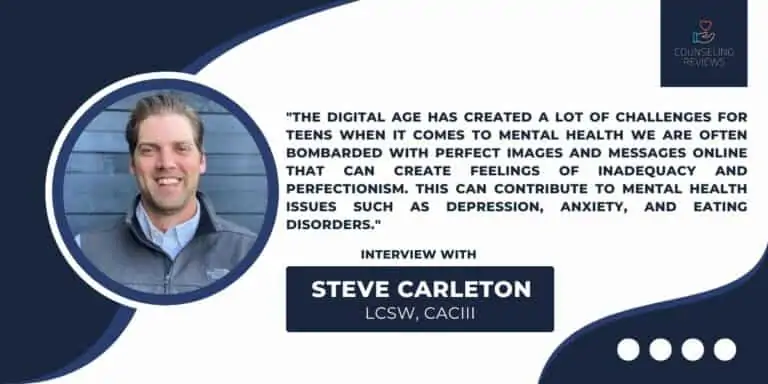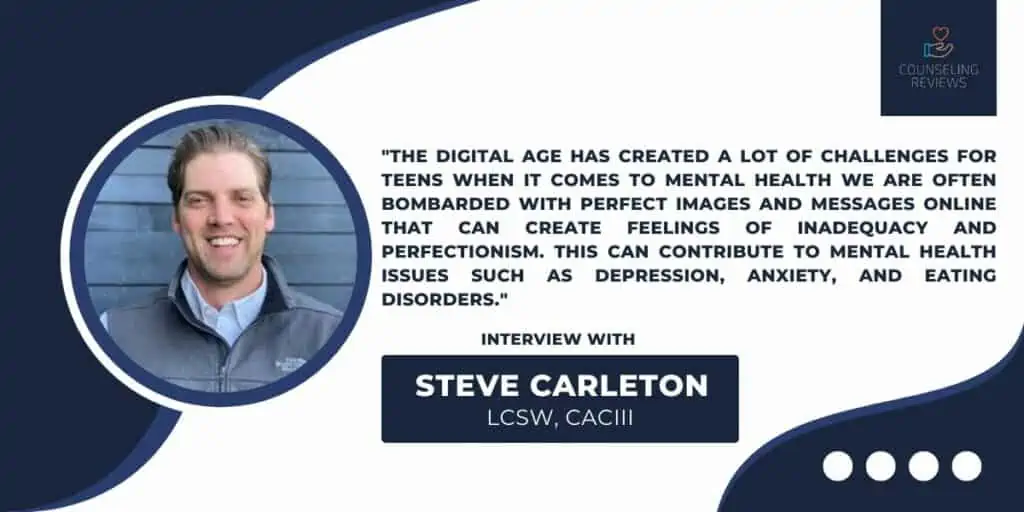
It is a fact that teenagers who display a higher stress reactivity tend to be more vulnerable to environmental stressors. Perceived stress among adolescents may stem from various sources ranging from parental relationships, school environment, and peer pressure.
According to a Polish study conducted in the Wielkopolska province, girls were three times likelier than boys to experience a high level of perceived stress. On the other hand, boys experience significant stress due to interpersonal relationships.
The study was published in the International Journal of Environmental Research and Public Health, and the authors recommend preventative programs to mitigate the distress experienced by teenagers.
To better understand the US situation, we briefly spoke to Steve Carleton, LCSW, CACIII, a licensed Clinical Social Worker and the Executive Clinical Director at Gallus Detox. He has over 16 years of experience and closely works with children with a variety of problems. He tackles issues ranging from difficulties at school to body image issues. He also helps parents cope with their teenagers’ issues in a healthy and constructive manner.
He tackles teen counseling issues ranging from difficulties at school to body image issues. He also helps parents cope with their teenagers’ issues in a healthy and constructive manner.
Teen consulting
1. What challenges do teens face today?
The digital age has created a lot of challenges for teens when it comes to mental health. Social media can be a great way to connect with friends and family, but it can also be a source of intense anxiety and stress.
We are often bombarded with perfect images and messages online that can create feelings of inadequacy and perfectionism. This can contribute to mental health issues such as eating disorders, risky behaviors, depression and anxiety.
2. In what areas are these challenges most evident?
Teens face a lot of challenges dealing with school and the pressure to succeed. With college admissions being very competitive, many students feel pressured to get good grades and test scores, leading to school-related stress and anxiety.
In addition, many teens feel compelled to participate in extracurricular activities and volunteer work to stand out on their college applications.
Some even resort to unhealthy behaviors, such as taking Adderall to help them focus. Using steroids to bulk up for sports is a different matter altogether. Studies show that about 550,000 young men and women have used anabolic steroids at least once.
3. Before the pandemic, what were the most common challenges you faced while dealing with teens?
Anxiety and major depressive disorder were my teenage clients’ most common mental health issues. Many teen struggles with perfectionism, serious self esteem issues, body image issues,substance abuse issues and social media anxiety. They also dealt with school-related stress and uncertainties about the future.
The pandemic has created a lot of uncertainty and stress in everyone’s lives, which can exacerbate many of these challenges and trigger a mental health condition in people who are already vulnerable to mental illness.
Most teens and young adults who have experienced abuse, neglect, or other trauma may be likelier to develop PTSD, experience depression , anxiety, and substance abuse disorders. Youngsters who have witnessed violence or been victims of bullying are also at risk for developing mental health issues.
Statistics reveal that in 2018, 11.93% of 12 to 17-year-olds reported suffering from at least one major depressive episode, with Hawaii and Indiana clocking in the highest rates (9.87% and 14.64%, respectively).
Teen consulting

4. What would you advise parents with troubled teens post-pandemic?
As a parent, it isn’t easy to care for a teen. The most important thing they can do is talk to their teens about their mental health and how they feel. If they are struggling, parents must encourage them to seek help from a therapist or counselor. It’s also essential to ensure they get enough sleep, exercise, and healthy food.
Finally, trying to be understanding and patient with teens is critical. They go through many life changes and may not always know how to express their feelings. Parents should tell them they’re there for them and love them unconditionally.
As for parents themselves, they should take some time for themselves to relax and recharge. This will help them cope better with raising teens with problems.
5. What is the best therapy teens can get?
This depends on the individual teen’s behavior, and what their specific needs are. Some may find it helpful to talk about their experiences in teen therapy, while others may benefit from creative therapies such as art or music therapy.
Note that a teen’s comfort and trust level with their therapist is of utmost importance for therapy to be successful.
It is crucial for parents not to assume and insist on what they think teens should do in therapy. They should support and let their teens choose what feels right. Therapy and healing take time. Parents must be patient and supportive throughout the process.

Watch Out for Warning Signs, and Get Help as soon as Possible
Indeed, teenagers have always experienced psychological problems while growing up. While most of these can be attributed to coping mechanisms in a rapidly changing atmosphere, many may need assistance from a mental health provider.
As Steve Carleton explains in the interview, teenagers today experience increased pressure to perform in school and may also have body image issues due to overexposure to social media content.
Addressing these family issues early on helps teenagers to learn healthy coping mechanisms and adapt to changes in a suitable manner.
Parents must observe their child or teens’ behavior and ensure that they receive professional help if something feels amiss. As teenagers may be reluctant to share their problems, it helps to be more understanding and empathetic towards them.
Teen consulting
Teen Counseling FAQs
Often discussed in counseling. Transition into college. Change. Alcoholist. Angers management. Anxiety / Stress. Behavior Changes and moods depressing. – Having food problems. Grievance and losses.
Parents can consult a counseling therapist to help with their teenager in a number of ways, but therapy cannot be reserved for traumatized situations or serious mental illnesses. Early intervention from a qualified practitioner is able to help prevent minor difficulties. Sometimes just talking to someone in your life can enhance your youth’s happiness levels. However, you might find a third party who may have noticed your teenager withdrawing emotionally or physically.
A lot of adolescents hide mental illness from their parents. It’s normal for people to fear the consequences they face and to fear the loss of their own life experiences. It’s particularly difficult to distinguish when adolescents need therapy and when their parents simply need help. You may notice the behavior changes, or a change of behavior in a young adult that indicates they’re needing help. Keep in contact and ask them questions about their lives and their interests and encourage open and honest relations.





